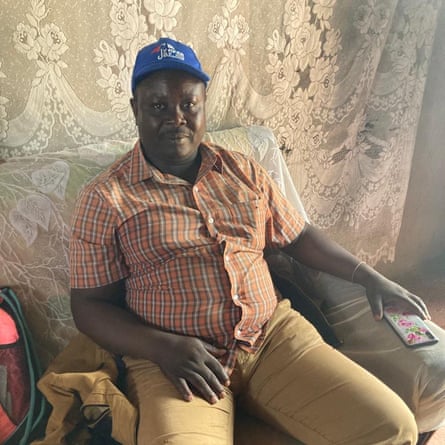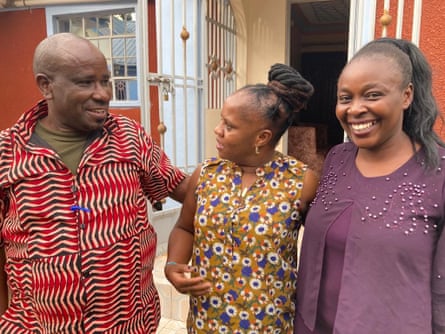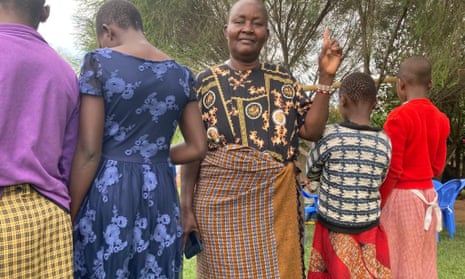Half rising from the plastic white chair, he jabs a finger toward a girl and her school friends sitting across the circle from him. “She will have a future,” says Patrick Ikware, almost shouting. “This cult is diminishing, but to eliminate it, we need to substitute education, send our daughters to school and block our ears to the elders.”
The handful of others sitting on mismatched chairs on the grass outside the school in Masaba nod. A parents’ meeting held for those opposed to female genital mutilation (FGM), a practice almost universal among women in the Kuria districts of Migori county, western Kenya, is sparsely attended.
But his daughter, grinning shyly at her father’s defiant words, like all their daughters, is still at risk. Relatives here, even neighbours, will entice a girl to the cutting ceremonies if her parents are not vigilant.
“The problem we have is people who cannot look beyond their own roof! The elders, our parents and relatives, even our friends, say you have to cut,” says Ikware.
“They cannot tell me what to do with my daughters and if my daughter graduates from here, I don’t have to expect her to marry around this community. There are other places.”
The campaign to stop the mutilation of the genitalia of hundreds of girls at the end of next month, when schools close for Easter, is in full swing here. School holidays are when the cuttings happen, on girls from six upwards. The longer the holiday, the more girls who will be cut, and from March schools are closed for seven weeks. The Christmas holidays took everyone involved in the anti-FGM movement here by surprise – cutting ceremonies began at scale in town centres all over Kuria, on the Kenyan border with Tanzania, enabled by a lack of law enforcement thanks to the Covid lockdown.
Despite the passion of the volunteers advocating against FGM, the activists talking on every local radio station about the terrible mental and physical toll, the committees, the legislation, and even the Kenyan president decrying the illegal practice, the pull and power of tradition is strong, and it is hard to be shunned by neighbours and family in a small place where life is tough.
The pressure to conform is huge. Uncut girls are bullied, called nasty names. Fathers and brothers are teased or ridiculed. In rare cases where a girl gets married without being cut, mortified in-laws have been known to bribe a nurse to cut her labia off in the aftermath of childbirth.
It is women, less educated and with less ability to leave the confines of the community, who feel the expectations to have their daughters cut most keenly, perpetuating the tradition even as they know the damage wreaked on their own bodies. Girls with nothing see a day when they are given praise, a present, maybe even a few banknotes pinned to their clothes. And they can be part of the processions that mark Kuria’s unique FGM celebrations, when the blood that leaks from newly cut bodies is camouflaged by paint daubed on the victims or scuffed into the dust by dancing feet when it hits the ground.
Q&AFemale genital mutilation: what does it involve and what are its consequences?
Show
Female genital mutilation (FGM) is the removal of part or all of the external genitalia for nonmedical reasons, as defined by the World Health Organization.
There are different types of cutting: removal of the clitoris and/or its hood; removing the clitoris and the inner fold of the vulva (labia minora); and the narrowing of the vaginal opening by cutting and repositioning the labia minora through stitching. Also known as infibulation, this has the worst health consequences. The fourth type of cutting includes other forms of injury to the genitalia such as incising, scraping or cauterising.
Since traditional practitioners use razor blades or knives, with no anaesthesia, girls experience excruciating pain and are at risk of severe bleeding and infections which can lead to sepsis. Some do not survive.
For the girls, who are often married off soon after genital cutting, sex is traumatic and painful, and enjoying sex will always be difficult unless they have surgical reconstruction.
In pregnancy, delivery is often risky due to obstructed and prolonged labour. Women are at risk of developing obstetric fistula (an abnormal opening between a woman’s genital tract and her urinary tract or rectum) which can cause incontinence – leading to shame, stigma and rejection from their partners.
- Dr Mercy Korir is a medical doctor and health and science editor at the Kenyan media organisation Standard Group
Kuria, just west of the safari camps of the Maasai Mara national reserve, has so far escaped the droughts of other parts of east Africa and the fawn hides of the cows are shiny and little goats plump-bellied. But there are still harrowing levels of poverty and people who cannot afford school uniforms, shoes, fees and books. Covid entrenched the economic situation, while many boys and girls haven’t returned to education after the pandemic’s school closures.
But girls still fetch a few cows in dowry, making the 1,000 to 2,000 Kenyan shillings (£6.50 to £13) it costs to pay a cutter an investment. And money is at the root of the challenge of stamping out this brutal practice in Kuria.
Zacharia Gati Marwa, cultural coordinator of Kuria’s council of elders, sits on a bench in his low-roofed mud-brick home. He could also be accused of sitting on the fence. He has been engaging with activists who want an end to FGM and says his own daughters are not cut, but he has sympathy for those elders who resist using their authority to end the cutting. The four clans of the region are represented by 160 elders, who direct around 40 cutters, taking the profits they make for themselves.

“The elders are not rich men,” says Marwa. “Many are very poor and without this money, they have even less income. The money collected is important. There’s an income impact here.
“But the last two years we have seen at least sections of the members start to change their mindset. About a third still resist.
“When they are planning how the cutting should take place, they consult the spirits and then gather the cutters, and prepare charms to help,” he says. “There are 40 cutters at any one time, chosen by the spirits. They cannot refuse the task if they are chosen, it is a calling and they are taught how to cut by the spirits. Any woman cannot just wake up and start cutting girls.
“To end FGM, we should buy these men a house so they can be secure, and pay to educate their daughters, then those girls can say ‘look I’m not cut and I’m the child of an elder’. I think this is the only way.
“At the moment, the biggest cultural threat to the elders’ way of life is … the changes to do with FGM.”
Merida Omahe and her husband, Martin, run a tiny hotel, the Black Bull, in Migori, but most of her work now is looking after the neighbourhood’s girls. As we talk, two mothers, Esther Mbusiro and Mary Marko, turn up at their gate. They want to know if their daughters can come and hide out with Merida during the cutting season to keep them safe.
“Yes, I remember what happened to me. There was quite a party,” Merida says, with heavy irony. “When I was a girl, everyone was supporting it. Sometimes I feel traumatised. I was hit, and I bled a lot. I had hidden and managed to escape it for a few years but when I was 21, I was taken by force. Then it was a rite of passage into adulthood and marriage, but I was much older than what is happening now.”
“Now I can stand up for these young girls. One person in two will listen to you. Often they will hide such things from their husbands.”

Her husband of 45 years supports her, even when 185 children ended up hiding out from the cutters at their family compound in December. “Now it’s five,” he smiles. “The ones we have at home, the rescues we have done, these children who run to her, who don’t want to be cut, I feel what she is doing. It touches me. She has a soft heart. At first, she was doing it alone, but now there are like-minded people,” he says.
He believes local people will bring change, not the big NGOs or UN agencies. “The people who come from outside are intruders, and we don’t want them to punch holes in our culture. It’s for our people to decide what is best for them. That’s why activists from here are so important. We have to talk to our young men. These are the boys who will marry these girls, and if they shun FGM, it will stop.
“The women work very hard in our community. They do all our donkey work. I salute them.”
A woman who is married but not cut is called irikunena and the unmarried girls are called mosagane – rude and demeaning terms, says Janet Ghati, 15, an orphan who is one of the five still living with the Omahes. She gets a lot of verbal abuse for not being cut, but says teachers will intervene to stop the bullying if they hear it. “I don’t want to be cut, but sometimes when I am abused at school, I feel torn over my decision. It happens a lot, but I have never been driven to drop out of school. I would like to be a doctor.”
Perched on a plastic chair next to her is her friend Rahena, also 15, a survivor of FGM. She now has a phobia of blood. “They did a bad thing,” she says, “I never wanted it to happen. I felt horrible, helpless. I had no phone to call Mamma. I couldn’t believe it had happened to me. It took one month for the pain to go.”
Meride, along with Vincent Mwita, coordinator of the umbrella anti-FGM activist group Tunaweza, managed to get to Rahena before she was married off.
“It is an unfortunate story,” she says, “we were protecting her when we heard she was at risk of child marriage, but her brother grabbed her at night. She was a very unhappy girl when we found her.”
We enjoin in consultative & review meeting for cross-border journalists and activists from Tanzania & Kenya towards strategies to #EndFGM for the upcoming Easter holiday with focus on cross border by @GMCEndFGM @UNFPA @maggie_okane @dorcusindalo1 @Power2YouthKe#MediaToEndFGM pic.twitter.com/sqjC5IXZFK
— Tunaweza Empowerment Organization. (@TunawezaEmpower) February 11, 2022
For such “rescues” they hire a motorbike taxi to pick the girls up. It’s costly, and Mwita hopes Tunaweza can one day buy their own motorbike, but it’s an expensive purchase. Police rarely agree to attend, citing a lack of staff or fuel for their vehicles, he says, but many people in the community will report cuttings and activists’ phone numbers are widely distributed for emergency call outs.
“Rahena’s brother had to go into hiding in Tanzania after he was reported to the authorities for this,” he says.
In December, police arrested 57 parents. Most are waiting for their court cases to be heard. The jail sentences for being involved in FGM are up to 3 years and, as the child has to give evidence, are controversial.
“It’s splitting up families,” says county children’s officer Janet Robi. “Currently, we have 94 children lined up to testify against their parents, but until then we have to find places to look after them.” Without enough children’s homes places, some are waiting in police cells or adult remand centres, she says.
“In the past, FGM cases crumble because the children have to stay with relatives and they are coached on what to say in court. Or they are spirited off to Tanzania. Yesterday, I had four children in my office. Both parents had been arrested so we are doing a petition to the court to release one caregiver. This is our challenge. Even if you arrest a cutter – [and it is] difficult to catch them in the act – you then make room for a less experienced one to take her place. These women are not trained.”
Head of county education Rev Samson Maginga, Robi, and district child protection head Catherine Tingo are discussing their anti-FGM work.

“In Kenya, we have 43 tribes, only five are not practising FGM,” says Maginga. “Kuria is only 300,000 people, but it stands out because we have both the backflow from Tanzania and the music and dancing as people go out on to the roads to celebrate. It is very colourful. Kuria is famous for two things: FGM and cattle rustling. And cattle rustling is becoming less of a problem as it’s taken seriously,” he says.
“I was at a funeral this morning. There was an old man there, 90 years, with the long pierced ear lobes that men used to have, he was asking about the FGM work and he said to me: ‘Look at my ears, our people don’t follow this tradition any more, so why do they hang on to cutting up our girls?’
“But we glorify it, the pain or enduring the pain is glorified for these kids, some of whom will never have before been congratulated for anything in their lives. This is a two-faced devil,” he says. “Some say they will do one thing and do another. An example? One of the senior officials who went out to make arrests in December? Her 10-year-old daughter was cut at the same time.”
This is a national election year for Kenya, a sometimes volatile time when division is whipped up into violence by the unscrupulous. Tingo says politicians are so keen for votes that they will not speak out against FGM. “This is something that’s already outlawed. The only people we have to conquer in this campaign are the political classes. The day we have a politician stand on a podium and talk about FGM, and say ‘this has had its day’, we are done and dusted.”
Sign up for Her Stage to hear directly from incredible women in the developing world on the issues that matter to them, delivered to your inbox monthly:
